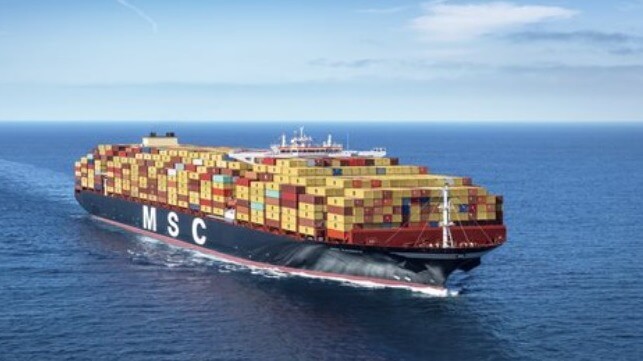MSC to Use DNV System to Reduce Dangers of Parametric Rolling

After a series of high-profile container losses in recent years, the shipping industry is taking steps to address the challenges of parametric rolling which builds quickly and in the case of containerships can subject them to stains that exceed the limits of lashing and stacking systems. Mediterranean Shipping Company is becoming the first global liner company to implement a new system developed by DNV to reduce the risk of container losses due to parametric or synchronous rolling.
MSC plans to install the new DNV Anti-Roll Assist system and obtain the ARCS (Anti-Roll for Containerships) class notation developed by the society. DNV explains that its new Anti-Roll Assist helps vessel captains to recognize and avoid the risk of parametric and synchronous resonant rolling. By using a ship-specific hydrodynamic database, DNV says the system can provide a risk picture for the vessel, based on its heading, speed, loading condition, and environmental conditions.
“The combination of factors that lead to rolling which can result in container loss can be very hard to predict,” explains Jan-Olaf Probst, Director Business Development Hamburg and Executive Vice President at DNV. “In developing the Anti-Roll Assist we wanted to give captains and crews a very clear and simple picture of the risk, based on a combination of crucial factors, including their vessel’s heading and speed. The application can also support the captain and crew in assessing if a navigational adjustment is required. Additionally, through the integration of advanced weather models, Anti-Roll Assist can be used to determine the best route to avoid extreme motions during route planning, helping to optimize ship operations.”
DNV highlights that the Anti-Roll Assist system can stand alone or be integrated into other onboard systems, such as lashing computers, weather routing tools, or navigation systems. They are also supporting the use of the system with the introduction of a new class notation for owners to demonstrate their strategy to minimize the risks by implementing the software solution.
MSC, which currently operates nearly 700 containerships, will implement the system initially on 100 of its vessels integrating it into their onboard weather routing systems. The contract with DNV reportedly covers dozens of newbuildings, ships in operation, and vessels to be constructed, ranging in size from 1,800 to MSC’s largest vessels at some 24,000 TEU.
“We are always looking for new solutions to minimize risk and the new Anti-Roll Assist gives MSC a new tool that can empower our people both on-board and on-shore,” said Giuseppe Gargiulo, Head of Newbuildings at MSC. “By implementing the new application on our vessels captains and crew can both plan ahead and react in the moment when a potentially critical situation is identified – enhancing our safety culture. Implementing this into our current newbuildings is a natural first step.”
The new offering from DNV is one of several steps being taken within the shipping industry to better understand and respond to the dangers of parametric rolling. Last year, the World Shipping Council, announced a three-year research effort to improve the safety of container vessels reporting that parametric rolling in a following sea had been identified as one of the dangers to the vessels. Ships have reported instances where they heel up to 46 degrees in a very short time.
A Danish company that manufactures sensors announced last week that it had completed testing on a new system to predict the onset of parametric rolling working with Maersk. Its sensors take measures at the bow, amidship, and at the stern and can alert the crew or adjust course to help stabilize a vessel before it is fully overtaken by the onset of the phenomenon.
